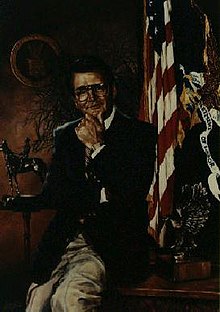Raymond J. Donovan
| Raymond J. Donovan | |
|---|---|

The official portrait of Raymond J. Donovan hangs in the Department of Labor
|
|
| 17th United States Secretary of Labor | |
|
In office February 4, 1981 – March 15, 1985 |
|
| President | Ronald Reagan |
| Preceded by | Ray Marshall |
| Succeeded by | William E. Brock |
| Personal details | |
| Born |
August 31, 1930 Bayonne, New Jersey, U.S. |
| Political party | Republican |
| Spouse(s) | Catherine Donovan |
| Children | Kenneth Donovan Mary Ellen Donovan Keith Donovan |
| Alma mater | Notre Dame Seminary |
| Profession | Politician, Businessman |
| Religion | Roman Catholic |
Raymond James "Ray" Donovan (born August 31, 1930) is an American businessman and former politician. He served as U.S. Secretary of Labor under President Reagan.
Donovan was born in Bayonne, New Jersey, on August 31, 1930. He attended the Notre Dame Seminary in New Orleans, Louisiana. He worked as a union laborer in summers and received a B.A. in philosophy. He married Catherine Sblendorio in 1957. They had three children: Kenneth, Mary Ellen, and Keith Donovan. Donovan worked for the American Insurance Company and Schiavone Construction Company, becoming the Vice President in charge of labor relations, finance, bonding and real estate in 1959, and by 1971 its Executive Vice President.
Reagan appointed Donovan the Secretary of Labor on February 4, 1981, and he served in this office until March 15, 1985. Under his secretaryship, he reduced the department's staff and budget, granted regulatory relief to businesses through changes in Occupational Safety and Health Act (OSHA) enforcement practices, revised the Davis-Bacon rules, modified Employee Retirement Income Security Act (ERISA) rules, created new industrial home work rules, and revised the federal compliance regulations.
In a highly publicized 1987 case, Donovan and six other defendants were indicted by a Bronx County, New York, grand jury for larceny and fraud in connection with a project to construct a new line for the New York City Subway, through a scheme involving a Genovese crime family associate and a minority-owned subcontractor. Schiavone Construction was obligated to subcontract part of the work to a minority-owned enterprise. The essence of the charge was that because the minority owned firm (Jo-Pel Contracting and Trucking Corp) leased equipment from Schiavone, that it was not truly independent of Schiavone.
...
Wikipedia
